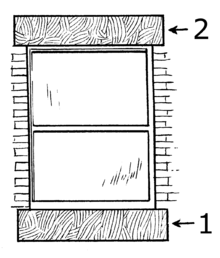sill
English
[edit]
2: Lintel
Pronunciation
[edit]Etymology 1
[edit]From Middle English sille, selle, sülle, from Old English syll, syl (“sill, threshold, foundation, base, basis”), from Proto-Germanic *sulī (“bar, sill”), from Proto-Indo-European *sel-, *swel- (“beam, board, frame, threshold”).
Cognate with Scots sil, sill (“balk, beam, floor, sill”), Dutch zulle (“sill”), Low German Sull, Sülle (“threshold, ramp, sill”), German Süll, Sülle (“threshold, sill”), Danish syld (“base of a framework building”), Swedish syll (“joist, cross-tie”), Norwegian syll, Icelandic syll, sylla (“sill”). Related also to German Schwelle ( > Danish svelle), Old Norse svill, Latin silva (“wood, forest”), Ancient Greek ὕλη (húlē).
Noun
[edit]sill (plural sills)
- (architecture, also "window sill") A breast wall; window breast; horizontal brink which forms the base of a window.
- She looked out the window resting her elbows on the window sill.
- (construction) A threshold; horizontal structural member of a building near ground level on a foundation or pilings, or lying on the ground, and bearing the upright portion of a frame; a sill plate.
- (geology) A stratum of rock, especially an intrusive layer of igneous rock lying parallel to surrounding strata.
- 1980, Geological Survey Professional Paper, Volume 1119, U.S. Government Printing Office:
- Minor palingenetic magmas probably were generated at this time and intruded the mantling rocks in the form of small sills and apophyses […] .
- 2018, Tim Flannery, Europe: The First 100 Million Years, Penguin, published 2019, page 55::
- The molten rock in the sills may have ignited vast reserves of shallowly buried natural gas, much like a match applied to a gas barbecue.
- A threshold or brink across the bottom of a canal lock for the gates to shut against.
- (anatomy) A raised area at the base of the nasal aperture in the skull.
- the nasal sill
- (military, historical) The inner edge of the bottom of an embrasure.
Usage notes
[edit]Quotations
[edit]- For quotations using this term, see Citations:sill.
Derived terms
[edit]Related terms
[edit]Translations
[edit]
|
|
|
|
- The translations below need to be checked and inserted above into the appropriate translation tables. See instructions at Wiktionary:Entry layout § Translations.
|
Etymology 2
[edit]Compare sile.
Noun
[edit]sill (plural sills)
Etymology 3
[edit]Compare thill.
Noun
[edit]sill (plural sills)
Etymology 4
[edit]Short for silly.
Adjective
[edit]sill (comparative more sill, superlative most sill)
References
[edit]- Harris, Cyril M.. Illustrated dictionary of historic architecture. New York: Dover Publications, 1983, 1977. Groundsill →ISBN
Anagrams
[edit]Romanian
[edit]Etymology
[edit]Unadapted borrowing from French sill, from English sill.
Noun
[edit]sill n (uncountable)
Declension
[edit]Swedish
[edit]
Etymology
[edit]From Old Norse síld, from Proto-Germanic *sīlą.
Pronunciation
[edit]Noun
[edit]sill c
Usage notes
[edit]- Herring from the Atlantic on Sweden's west coast is called sill. The subspecies fished from the Baltic Sea on Sweden's east coast is called strömming.
Declension
[edit]Derived terms
[edit]- fetsill
- glasmästarsill
- islandssill
- kryddsill
- lipsill
- löksill
- matjessill
- pipsill
- saltsill
- senapssill
- sillake
- sillbit
- sillbord
- sillbricka
- sillbulle
- sillburk
- sillfilé
- sillfrukost
- sillgrissla
- sillhaj
- sillinläggning
- sillkung
- sillmjölke
- sillolja
- sillperiod
- sillrökeri
- sillsallad
- sillsalteri
- sillsexa
- sillstim
- sillstrypare
- silltrut
- silltunna
- sillval
- sillåda
- skarpsill
- spickesill
See also
[edit]References
[edit]- sill in Svensk ordbok (SO)
- sill in Svenska Akademiens ordlista (SAOL)
- sill in Svenska Akademiens ordbok (SAOB)
Welsh
[edit]Etymology
[edit]See the etymology of the corresponding lemma form.
Noun
[edit]sill f (plural sillau or silloedd, not mutable)
- Alternative form of sillaf (“syllable”)
Further reading
[edit]- R. J. Thomas, G. A. Bevan, P. J. Donovan, A. Hawke et al., editors (1950–present), “sill”, in Geiriadur Prifysgol Cymru Online (in Welsh), University of Wales Centre for Advanced Welsh & Celtic Studies
- English 1-syllable words
- English terms with IPA pronunciation
- English terms with audio pronunciation
- Rhymes:English/ɪl
- Rhymes:English/ɪl/1 syllable
- English terms inherited from Middle English
- English terms derived from Middle English
- English terms inherited from Old English
- English terms derived from Old English
- English terms inherited from Proto-Germanic
- English terms derived from Proto-Germanic
- English terms derived from Proto-Indo-European
- English lemmas
- English nouns
- English countable nouns
- en:Architecture
- English terms with usage examples
- en:Construction
- en:Geology
- English terms with quotations
- en:Anatomy
- English terms with collocations
- en:Military
- English terms with historical senses
- British English
- English adjectives
- English terms with rare senses
- English slang
- English calculator words
- Romanian terms borrowed from French
- Romanian unadapted borrowings from French
- Romanian terms derived from French
- Romanian terms derived from English
- Romanian lemmas
- Romanian nouns
- Romanian uncountable nouns
- Romanian neuter nouns
- ro:Geology
- Swedish terms derived from Old Norse
- Swedish terms derived from Proto-Germanic
- Swedish terms with audio pronunciation
- Swedish terms with IPA pronunciation
- Swedish lemmas
- Swedish nouns
- Swedish common-gender nouns
- sv:Herrings
- Welsh lemmas
- Welsh nouns
- Welsh countable nouns
- Welsh non-mutable terms
- Welsh feminine nouns
- cy:Linguistics
